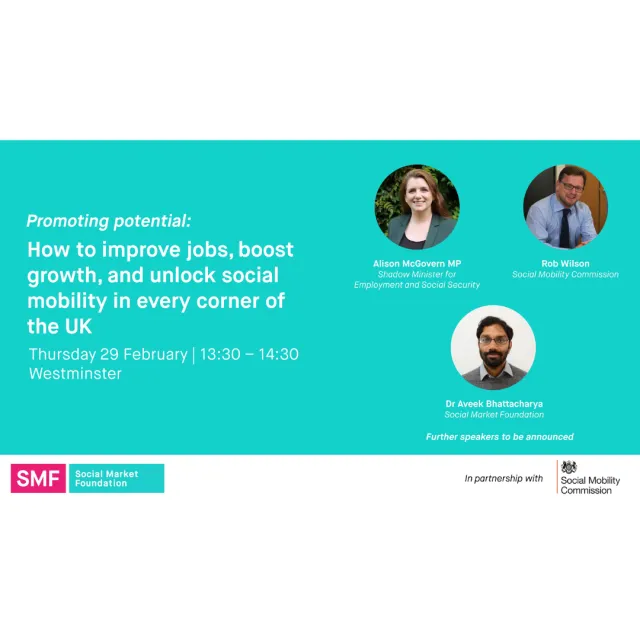On Thursday 29th February, we hosted a dynamic panel discussion, in collaboration with the Social Market Foundation, exploring how regional economic growth and better employment opportunities are key to supporting social mobility.
Our panel of experts was made up of Alison McGovern MP (Shadow Minister for Employment and Social Security), Rob Wilson (Deputy Chair, Social Mobility Commission) and Jon Gibson (Head of Policy and Public Affairs, West Midlands Combined Authority) and the event touched on a variety of key issues, including:
- How far does the skills and education system improve or contribute to regional disparities in economic growth?
- What part do strong links between education and skills provision, local authorities, businesses and community groups play in stimulating regional areas for growth?
- Should a devolved policy approach to tackling social mobility be adopted?
You can watch the full recording below, or read on for our key takeaways.
SMC Deputy Chair, Rob Wilson, opened the event with an overview of the current state of social mobility in the UK. While there is “no convincing evidence that social mobility is in decline in the UK, not going backwards,” he said, referencing our 2023 State of the Nation report, “that doesn’t mean we shouldn’t be doing everything we can to go forwards.”
What does emerge from our report is a very complex and nuanced picture of who is doing well, with very significant variation by geography, and regional disparities deeply entrenched in certain areas.
It’s not fair, Rob said, that people have to move away from home to get better opportunities. Regional economic growth and social mobility are two sides of the same coin, with more employment opportunities and better wages ultimately leading to more upward mobility.
There’s a role for everyone in addressing these challenges, but some of the key points our panel raised were:
1. Better data
Currently, the data only lets us drill down to large county level, so one of the SMC’s priorities is to get more data sets to allow for a more nuanced, localised approach. “Poverty doesn’t really know any boundaries,” Rob summed up, making the point that pockets of poverty and extreme hardship can be found everywhere, so we need data which allows us to drill down as far as we possibly can.
Jon pointed out that the current data does not always accurately capture what’s really happening in the local economy. In the West Midlands, data is available for 3 LEP areas; however, 1 in 4 people work somewhere else, in a different area. “You have extremely strong movement people across the region,” he said, “the economy does not stop at an administrative boundary.”
2. Involving employers
Alison McGovern reminded us that “in years gone by the focus would often be on education,” when it came to growing opportunities and increasing social mobility. However, many issues “can be addressed as much by employment policy as by education policy.”
There are also practical actions that employers can take immediately. Alison drew attention to the many innovations already taking place in organisations across the country, particularly those relating to more inclusive hiring practices. Many organisations are no longer asking for specific grades from applicants, or removing educational institution information from CVs, focusing on skills based recruitment. Some, Alison said, are no longer requesting CVs at all, instead asking applicants to demonstrate specific skills such as video content creation.
For actionable advice on how your organisation can help increase social mobility, have a look at our employer toolkits. These industry-specific toolkits provide advice and guidance for organisations wanting to increase socio-economic diversity, whether you’re just starting out or looking to become a leader in your field.
3. Alternative routes
University should not be the only route to a well-paid job. However, adult education has declined in recent years, and there has also been a drop in apprenticeship starts, particularly in disadvantaged areas. Alison suggested that apprenticeships should be included as part of every place’s growth plan, as the data is clear that these opportunities aren’t currently reaching the people they should. Nor should it be a case of “university or apprenticeships,” but encouraging HE, FE and employers to work together as part of an integrated skills system.
Jon has found that devolution of adult skills policy has really allowed the West Midlands Combined Authority to tailor their provision to match local labour market needs, so that the types of courses offered reflect local growth industries, such as Business Services and the automotive industry. Through this they have trained 160,000 more people to Level Three since 2019 and reduced the number of people without any qualifications by 60,000.
4. Economic growth
Stagnant economic growth has continued since the 2008 financial crisis, and various industries have struggled despite the success of innovative companies. Rob believes that policies on competition may be forcing innovative companies into mergers and acquisitions, leaving companies which are not having a large impact on social mobility dominating some sectors.
He thinks that a broader understanding of competition policy is needed, considering aspects beyond price and market share, to encourage R&D investment and a broader number of companies entering the market employing people.
If you’re interested in hearing more about the SMC’s work on growing opportunities, look out for the publication of our Policy Action Plan in June 2024.
On Tuesday 12th March, we’ll be holding the second in this series of panel events. This time we’ll be partnering with Demos to consider how better data can drive social mobility, and you can find out more on our website.
